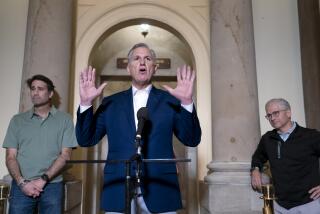Greek leaders fail to agree on new budget cuts
- Share via
Reporting from Athens — After seven hours of grueling nighttime negotiations, Greece’s fractious coalition government failed to agree on new budget cuts needed to secure a $170-billion bailout intended to stave off default, ease the country’s debt woes and pay off foreign creditors.
Prime Minister Lucas Papademos, however, met separately into the morning hours Thursday with a team of international lenders focusing on the lone deal-breaker — the creditors’ demands for even more slashing of state and private pensions.
All other creditor demands, Papademos said in a statement — including a 22% cut in private sector wages to make the struggling Greek economy more competitive — were accepted by his coalition leaders, capping weeks of intense political haggling and arm-twisting by foreign lenders who were losing faith with Athens’ political elite.
Three deadlines had come and gone this week alone, and a meeting of European finance ministers had to be rescheduled twice before the leaders of the socialist, conservative and far-right parties in Greece’s coalition government met Wednesday to review the 28-page deal.
With less than six weeks before a $19-billion bond redemption comes due on March 20, this tiny, debt-crippled country has little time to spare.
The Greek coalition’s three party leaders were expected to meet again Thursday, even as Finance Minister Evangelos Venizelos traveled to Brussels for a meeting with his counterparts from the 17-nation Eurozone.
International creditors — the European Commission, European Central Bank and the International Monetary Fund — have warned Athens that failure to accept about $4 billion in added austerity measures would end further funding. That would leave Greece without enough money to cover the March bond payments.
“The pressure has been intense,” said a senior government official of the creditors’ demands.
Since agreeing to an initial $150-billion rescue deal in 2010, Greece has tried to fix its economy by slashing state spending and increasing taxes. It has largely ignored promises to pare its bloated public sector, sell about $71 billion in state assets and implement a series of reforms, such as changing labor laws, to make the country more competitive.
Officials close to Wednesday’s talks said that much of that unfinished work — including the elimination of 15,000 civil service jobs this year — had been incorporated in the debt deal, part of a bigger and more complex plan to restructure Greece’s nearly $500-billion debt.
Greece’s Cabinet council was scheduled to convene to consider the economic plan, which would then be passed on to Parliament for ratification.
Although ultimate approval of an austerity plan appears certain — the three-party government controls 252 of the 300 seats in Parliament — dissent and back-bencher rebellions have increased as social unrest has grown across the country.
With unemployment topping 19% and nearly 30% of Greeks living below the poverty line, more lawmakers recently have been trying to dissociate themselves from brutal belt-tightening measures.
What’s more, debate is growing over whether harsher levels of austerity would actually work in a deeply depressed economy.
“It’s lunacy,” said Yanis Varoufakis, an economist at Athens University. “Greece should default, and the European Union should finally accept and deal with the inevitable, instead of pushing it under the carpet, like children trying to avoid being spanked.”
A second Greek bailout, he added, would “just throw good money after bad. What’s the purpose of getting an additional loan when it’s unlikely Greece will be able to repay it?”
With the country’s future in the Eurozone in question, Greece’s sentiments toward its peers have turned sour. A poll published this week showed that although 64% of Greeks supported staying with the euro as the nation’s currency, 54% viewed Europe’s stance in dealing with Greece’s debt woes as “negative.”
“You kind of wonder,” said Ioanna Apostolou, a 58-year-old teacher at an anti-austerity demonstration this week, “are they helping us? Or are they trying to punish us?”
Carassava is a special correspondent.
More to Read
Sign up for Essential California
The most important California stories and recommendations in your inbox every morning.
You may occasionally receive promotional content from the Los Angeles Times.













